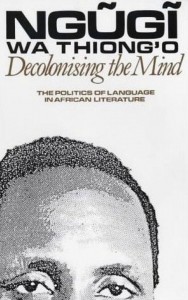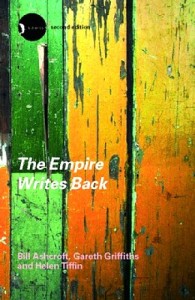“… make language stammer, or make it ‘wail,’ stretch tensors through all of language, even written language, and draw from it cries, shouts, pitches, durations, timbres, accents, intensities.” – G. Deleuze and F. Guattari, A Thousand Plateaus
Language is often a central question in postcolonial studies. During colonization, colonizers usually imposed or encouraged the dominance of their native language onto the peoples they colonized, even forbidding natives to speak their mother tongues. Many writers educated under colonization recount how students were demoted, humiliated, or even beaten for speaking their native language in colonial schools. In response to the systematic imposition of colonial languages, some postcolonial writers and activists advocate a complete return to the use of indigenous languages. Others see the language (e.g. English) imposed by the colonizer as a more practical alternative, using the colonial language both to enhance inter-nation communication (e.g. people living in Djibouti, Cameroon, Morocco, Haiti, Cambodia, and France can all speak to one another in French) and to counter a colonial past through de-forming a “standard” European tongue and re-forming it in new literary forms.

Most radical among those writers who have chosen to turn away from English, Ngũgĩ wa Thiong’o, a Gikuyu writer from Kenya, began a successful career writing in English before turning to work entirely in his native language. In Decolonising the Mind, his 1986 “farewell to English,” Ngũgĩ posits that through language people have not only described the world, but also understand themselves by it. For him, English in Africa is a “cultural bomb” that continues a process of erasing memories of pre-colonial cultures and history and installs the dominance of new, more insidious forms of colonialism. Writing in Gikuyu, then, is Ngũgĩ’s way not only of harkening back to Gikuyu traditions, but also of acknowledging and communicating their continuing presence. Ngũgĩ is concerned primarily not with universality, though models of struggle can always move out and be translated for other cultures, but with preserving the specificity of individual groups. In a general statement, Ngũgĩ points out that language and culture are inseparable, and that therefore the loss of the former results in the loss of the latter:
[A] specific culture is not transmitted through language in its universality, but in its particularity as the language of a specific community with a specific history. Written literature and orature are the main means by which a particular language transmits the images of the world contained in the culture it carries.
Language as communication and as culture are then products of each other … Language carries culture, and culture carries, particularly through orature and literature, the entire body of values by which we perceive ourselves and our place in the world … Language is thus inseparable from ourselves as a community of human beings with a specific form and character, a specific history, a specific relationship to the world. (15-16)
On the other side of the language debate is Salman Rushdie. Although Rushdie’s novels often tackle the history of India, Pakistan, Bangladesh, and Great Britain, his comments have wider relevance, particularly considering his status in world literature. He comments on how working in new Englishes can be a therapeutic act of resistance, remaking a colonial language to reflect the postcolonial experience (See Postcolonial Novel). In the essay “Imaginary Homelands” (from the eponymous collection published by Granta in 1992), he explains that, far from being something that can simply be ignored or disposed of, the English language is the place where writers can and must work out the problems that confront emerging/recently independent colonies:
One of the changes [in the location of anglophone writers of Indian descent] has to do with attitudes towards the use of English. Many have referred to the argument about the appropriateness of this language to Indian themes. And I hope all of us share the opinion that we can’t simply use the language the way the British did; that it needs remaking for our own purposes. Those of us who do use English do so in spite of our ambiguity towards it, or perhaps because of that, perhaps because we can find in that linguistic struggle a reflection of other struggles taking place in the real world, struggles between the cultures within ourselves and the influences at work upon our societies. To conquer English may be to complete the process of making ourselves free. (17)

The theoretical and scholarly debate about language is addressed in detail in The Empire Writes Back (1989). Bill Ashcroft, Gareth Griffiths, and Helen Tiffin explore the ways in which writers encounter a dominant, colonial language. They describe a two-part process through which writers in the post-colonial world displace a standard language (denoted with the capital “e” in “English”) and replace it with a local variant that does not have the perceived stain of being somehow sub-standard, but rather reflects a distinct cultural outlook through local usage. The terms they give these two processes are “abrogation” and “accommodation”:
Abrogation is a refusal of the categories of the imperial culture, its aesthetic, its illusory standard of normative or “correct” usage, and its assumption of a traditional and fixed meaning “inscribed” in the words. (38)
Appropriation is the process by which the language is made to “bear the burden” of one’s own cultural experience … Language is adopted as a tool and utilized to express widely differing cultural experiences. (38-39)
The authors are careful to point out, however, that abrogation alone, though a vital step in “decolonizing” a dominant language (see Ngũgĩ) is not sufficient, in that it offers the danger that roles will be reversed and a new set of normative practices will move into place.
Another issue Ashcroft et al. describe is the three types of linguistic communities they identify: the monoglossic, the diglossic, and the polyglossic. Monoglossic communities, corresponding roughly to old settler colonies, are places where “english” (the lower-case “e” in “english” denotes local, non-standard/British usage) is the native tongue. Diglossic communities, by far the most common of the three, occur where”… bilingualism has become an enduring societal arrangement, for example in India, Africa, the South Pacific, for the indigenous populations of settled colonies, and in Canada, where Québecois culture has created an artificially bilingual society” (39). Finally, polyglossic societies “… [o]ccur principally in the Caribbean, where a multitude of dialects interweave to form a generally comprehensible continuum” (39).
Many of the language issues Native Americans face parallel postcolonial debates, although the status of Native American studies remains unclear in postcolonial scholarship. Gerald Vizenor, a writer and critic, has celebrated english as a vehicle for resistance:
The English language has been the linear tongue of the colonial discoveries, racial cruelties, invented names, the simulation of tribal cultures, manifest manners, and the unheard literature of dominance in tribal communities; at the same time, this mother tongue of para-colonialism has been a language of invincible imagination and liberation for many people of the post-indian worlds. English … has carried some of the best stories of endurance, the shadows of tribal creative literature, and now that same language of dominance bears the creative literature of distinguished post-indian authors in cities … The shadows and language of tribal poets and novelists could be the new ghost dance literature, the shadow literature of liberation that enlivens tribal survivance. (Manifest Manners, 1994, 105-6)
The issue of languages raises several polemical questions for consideration in the study of literary texts: does the author choose to work in a local language or a major European one? If the former — how does the work get translated and by whom? What might the translation have done to the work? What kind of semantic processes of abrogation/deformation and appropriation/reformation occur in the work? When a local language lends terms, in what context do they occur? Finally, what does the use of language imply about an implicit theory of resistance?
For other views on language in postcolonial studies see authors such as: Braj B. Kachru, Raja Rao, Bill Ashcroft, W.H. New, Edward Kamau Brathwaite, and Chantal Zabus, among others.
See Representation, Languages of South Asia
Bibliography
- Al-Dabbagh, Abdulla. Literary Orientalism, postcolonialism, and universalism. New York : Peter Lang, 2010.
- Anchimbe, Eric and Stephen A Mforteh. Postcolonial linguistic voices : identity choices and representations. Boston : De Gruyter Mouton 2011
- Ashcroft, Bill, Gareth Griffiths, and Helen Tiffin. The Empire Writes Back: Theory and Practice in Post-Colonial Literatures. New York: Routledge, 1989.
- Britton, Celia. Edouard Glissant and postcolonial theory : strategies oflanguage and resistance. Charlottesville, Va. : University Press of Virginia, 1999.
- Deleuze, Gilles and Félix Guattari. A Thousand Plateaus:Capitalism and Schizophrenia, Vol. 2. Trans. Brian Massumi. Minneapolis: U of Minnesota P, 1987.
- Ngũgĩ wa Thiong’o. Decolonising the Mind: The Politics of Language in African Literature. Portsmouth, NH: Heinemann, 1981.
- Ramanathan, Vaidehi. The English-vernacular divide : postcolonial language politics and practice. Clevedon ; Buffalo : Multilingual Matters, 2005.
- Rushdie, Salamn. Imaginary Homelands. New York: Granta, 1992.
- Schneider, Edgar W. Postcolonial English : varieties around the world. Cambridge : Cambridge University Press, 2007.
- Talib, Ismail S. The language of postcolonial literatures : an introduction. London : Routledge, 2002.
- Vizenor, Gerald. Manifest Manners: Postindian Warriors of Survivance. Hanover, NH: Wesleyan/New England UP, 1994.
Links
The Ethnologue, an online version of the reference work describing most, if not all, of the world’s known languages, including creoles and pidgins.
http://www.sil.org/ethnologue/ethnologue.html
A collection of links to various Latin American language sites with both indigenous (Quechua, Aymara) and colonial (Spanish, Portuguese) languages and creoles. Also features a comprehensive list of other linguistics-oriented sites.
http://www.lanic.utexas.edu/la/region/languages/
Author: Jennifer Margulis and Peter Nowakoski, Spring 1996
Last Updated: July 2017
6 Comments
We all agree culture and language are inseparable. This means when a people’s culture disappears, their language becomes an orphan, invariably becoming the slave of the replacing culture. We all agree no culture (and, therefore, language) is inferior to any other one. Most intellectuals promoting indigenous languages mistake colonially imposed western cultures (dress, dance, architecture, literature, religion especially Christianity and Islam) to be their cultures. If we must jettison English, French, Portuguese, Spanish, Arabic, etc, we must jettison Christianity and Islam for Africa’s indigenous religions because the religion of a people is their constitution. But my country Nigeria has 500 indigenous languages! Does this mean 500 ethnic nationalities and allegiances with 500 cultures and religions and constitutions? isn’t this invitation to anarchy? Shall we not end up with 500 countries?
Language is an integral part of the culture, heir language becomes an orphan, invariably becoming the slave of the replacing culture. We all agree no culture (and, therefore, language) is inferior to any other one
Thanks, you was able to save me from a really long and troublesome afternoon. Completely Appreciated.
Hey, thanks for the great website.
You definitely put a new spin on a topic that’s been written about for years. Great stuff, just great!
Thank You , great article